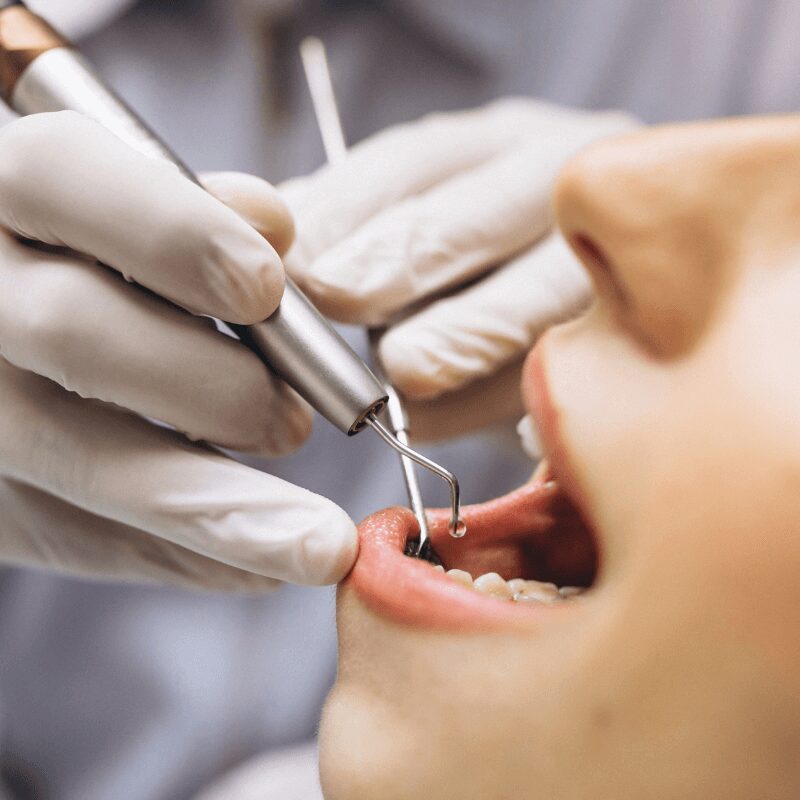Curious about the cost of teeth bonding?
On average, the price ranges from $300 to $600 per tooth. The total cost can vary based on several factors, including your geographic location, the dentist’s expertise, and the complexity of your specific dental needs.
Read on to discover a detailed breakdown of teeth bonding costs and the benefits it can offer.
Key Takeaways
- Dental bonding is a cost-effective, minimally invasive cosmetic procedure that enhances the appearance of teeth using a tooth-colored resin, typically completed in one visit.
- The average cost of dental bonding ranges from $300 to $600 per tooth, influenced by location, dentist experience, and complexity of the dental issue.
- Although primarily cosmetic, some insurance plans may cover bonding if it serves a restorative purpose; however, it’s important to verify coverage details with your provider.
Understanding Teeth Bonding
Dental bonding is a cosmetic dental procedure that uses a tooth-colored resin to enhance the appearance of your teeth. It’s a common choice for those looking to improve minor dental issues like chipped or cracked teeth, gaps between teeth, or discoloration. According to Cleaveland Clinic material used in dental bonding is a tooth colored composite resin, which is carefully matched to the color of your natural teeth to ensure a seamless look. Unlike dental veneers or crowns, bonding is less invasive and can be reversed if necessary.
One of the most appealing aspects of dental bonding is its affordability and accessibility. Unlike other cosmetic dental procedures, the dental bonding procedure can typically be completed in a single visit to the dental office. The process involves etching the tooth’s surface, applying a bonding agent, and then molding the resin to the desired shape through tooth bonding.


Average Cost of Teeth Bonding
Financial considerations are crucial when opting for any cosmetic dental procedure. The average cost of dental bonding ranges from $300 to $600 per tooth. Understanding these dental bonding costs helps patients budget effectively and set realistic expectations.
Dental bonding presents a more economical option upfront compared to alternatives like veneers. Always inquire about the dentist’s charges and check if any part of the procedure is covered by insurance, though this is rare.
Factors Influencing Bonding Costs
The cost of dental bonding can be affected by various factors. These influences can vary from one situation to another. Here are some key factors that can impact the cost:
- Location of your dental practice: Urban areas often have higher fees than rural ones.
- Dentist’s experience and reputation: More experienced dentists might charge higher fees, but the quality of their work often justifies the expense.
- Complexity of your dental issue: The more complex your dental issue, the more it may cost.
- Time required for the procedure: Longer procedures may incur higher costs.
- Materials used: The type of materials used for bonding can also affect the final cost.
Understanding these factors can help you anticipate the potential costs associated with dental bonding.
When considering dental bonding, it’s essential to weigh these factors. The number of teeth you need bonded also plays a role in the overall cost. For instance, bonding multiple teeth will increase expenses proportionally. Patients should also consider any additional costs, such as dental exams, cleanings, and potential professional teeth whitening, which may be recommended before the bonding process.
Comparing Costs Across Different Locations
The cost of dental bonding can vary significantly depending on where you live. For example, in Indianapolis, IN, the average cost ranges from $100 to $400 per tooth, influenced by the city’s moderate cost of living. These geographical differences can greatly affect your overall expenses, making it crucial to research and obtain quotes from multiple cosmetic dentists in your area.
Comparing costs across different locations helps you make an informed decision and possibly travel to a nearby city where dental services are more affordable.
Always ensure you get an accurate idea of teeth bonding costs by consulting with several dentists and asking for detailed quotes. This approach helps you budget effectively and choose a dental practice that fits your financial situation.
Insurance Coverage for Dental Bonding
When it comes to insurance coverage for dental bonding, the outlook isn’t very promising. Because dental bonding is primarily a cosmetic procedure focused on aesthetics, it is typically not covered by dental insurance. However, there are exceptions. If the bonding is needed for restorative reasons, such as repairing accidental damage or replacing fillings, some insurance plans might offer partial coverage. Contact your dental insurance provider to verify what is and isn’t covered.
Understanding the nuances of insurance coverage can help you avoid unexpected expenses. While cosmetic dental bonding usually falls outside the scope of insurance, discussing your specific needs with your dentist and insurance provider can sometimes yield surprising results. Always clarify these details before committing to the procedure to ensure that you are financially prepared for all associated costs.
Benefits of Teeth Bonding
Dental bonding offers numerous benefits, making it an attractive option. One of the most significant advantages is its cost-effectiveness. Compared to other cosmetic dental procedures like veneers or crowns, dental bonding is more affordable, making it accessible to a broader range of patients. The procedure is also quick and minimally invasive, often completed in a single visit without the need for anesthesia. This makes it an excellent option for those looking to make immediate improvements to their smile without extensive dental work.
Another advantage of dental bonding is its versatility. It can address various minor dental issues such as chips, cracks, and gaps between teeth. The composite resin used in composite bonding can be shaped and polished to match the surrounding teeth, providing a natural and aesthetically pleasing result.

This not only enhances your smile but also boosts your confidence, allowing you to smile without hesitation. Dental bonding is indeed a conservative yet effective way to achieve a smile makeover.
The Teeth Bonding Procedure
The dental bonding procedure is straightforward and usually completed in just one visit to the dental office. It begins with a dental examination and X-rays to assess the condition of your teeth and gums. A professional cleaning ensures that your teeth are free from plaque and bacteria, setting the stage for a successful bonding process.
This section will break down the procedure involves applying into two main parts: preparation for bonding and the application process.
Preparation for Bonding
Before the bonding process begins, your dentist will conduct a thorough examination of your teeth and gums to ensure you’re a suitable candidate for the procedure. Any cavities or severe decay need to be addressed first to ensure the health and longevity of the bonded tooth. Next, a professional cleaning is performed to remove any bacteria, tartar, or plaque that could interfere with the bonding process. This preparation step is generally minimal but crucial for achieving the best results.
Typically, dental bonding procedures are completed in a single appointment, where the dentist will also discuss any additional treatments that might be beneficial. These could include professional teeth whitening to ensure a uniform color match between your natural teeth and the bonded material. Thorough preparation sets the stage for a successful and aesthetically pleasing outcome.
Application Process
The application process for dental bonding is both efficient and effective. The process usually requires around 30 to 60 minutes for each tooth. Completion time may vary depending on specific circumstances. The dentist starts by applying a conditioning liquid to the tooth’s surface to enhance the adhesion of the bonding material. This is followed by the application of the tooth-colored resin, which is carefully shaped and molded to match the surrounding teeth.
Once the composite resin material is in place, a special curing light is used to harden the tooth colored resin material. After the resin has set, the dentist will trim, smooth, and polish it to achieve a natural look. The entire cosmetic dentistry procedure is typically completed in just one visit, making it a convenient option for patients seeking quick and effective cosmetic improvements. The result is a beautifully restored tooth that blends seamlessly with your natural teeth.
Longevity and Maintenance of Bonded Teeth
While dental bonding is a fantastic solution for many, its longevity depends on various factors. According to Colgate, dental bonding commonly has a lifespan of 3 to 10 years. This duration can vary based on individual circumstances. The quality of the bonding resin plays a significant role in this, with higher-quality materials generally offering more extended durability. Bonded teeth on the molars, which endure more wear and tear, may not last as long as those on the front teeth.
Maintaining good oral hygiene practices is crucial for the durability of bonded teeth and preventing issues like chipped teeth. Regular brushing, flossing, and avoiding habits like biting nails or chewing hard foods can help protect teeth, extend the life of your bonded teeth, and support overall oral health.
Regular dental check-ups are also essential to monitor the condition of the bonded teeth and make any necessary repairs or adjustments. By visiting the dentist regularly and following these maintenance tips, you can enjoy the benefits of dental bonding for many years.
When Dental Bonding May Not Be Suitable
While dental bonding is versatile, it may not be suitable for everyone. For instance, bonding is often not ideal for treating significant gaps or severely damaged teeth, as it may lack the necessary strength for effective restoration. In cases of severe decay, dental bonding cannot adequately restore structural integrity, making other treatments like crowns or veneers more appropriate.
Similarly, if you have severely misaligned teeth, orthodontic treatments are generally required to achieve proper alignment. Dental bonding is best suited for minor dental issues and cosmetic enhancements rather than substantial restorative work. Consulting with your dentist can help determine whether dental bonding is the right choice for your specific dental needs.
Comparing Dental Bonding to Other Cosmetic Procedures
Dental bonding stands out as a highly versatile procedure that can address various cosmetic concerns, such as chips, cracks, and discolored teeth. It is also effective for covering small gaps between teeth, making it a practical option for minor cosmetic issues. Compared to other cosmetic dental procedures like veneers and crowns, dental bonding is more affordable and less invasive.
However, dental bonding typically lasts between 5 to 10 years, whereas veneers can last up to 15 years or more. Dental crowns, although more expensive and invasive, provide full coverage and strength for damaged teeth.
Each option has its pros and cons, and the best choice for you will depend on your specific dental needs and budget. Consulting with a cosmetic dentist can help you weigh these options and choose the most suitable cosmetic treatment.
Affordable Options for Teeth Bonding

One of the most appealing aspects of dental bonding is its affordability. Cosmetic bonding is recognized as one of the least expensive options in cosmetic dentistry. Unlike porcelain veneers or crowns, dental bonding does not involve lab fees, making it a more cost-effective solution. Many dental practices, including Advanced Dental Care of Indiana, offer financing options that allow patients to spread payments over time, helping manage costs.
Additionally, dental discount plans can significantly reduce the cost of dental bonding. Utilizing services like CareCredit can help cover dental bonding expenses through flexible monthly payments tailored to your financial situation. Always inquire about these options when consulting with your dentist to find the most affordable way to achieve a beautiful smile.
Choosing a Cosmetic Dentist for Bonding
Selecting the right cosmetic dentist is crucial for achieving the best results with dental bonding. It’s important to choose a dentist who specializes in cosmetic dentistry and has ample experience with bonding procedures. Checking a dentist’s credentials, including any additional training in aesthetic dentistry, can indicate their level of expertise. Researching local dentists through online reviews and testimonials can help identify reputable professionals for dental bonding.
Consultation with a dentist is vital to determine the best treatment options based on your individual dental health needs. A dentist’s communication style is also crucial; they should be able to explain procedures clearly and address any patient concerns effectively.
Using advanced technology and tools can significantly enhance the quality and precision of dental bonding results. Consider the office atmosphere, including cleanliness and staff friendliness, as these factors can impact your overall dental experience.
Schedule your appointment with Advanced Dental Care of Indiana for fixing your broken tooth and achieving a beautiful smile.
Summary
Dental bonding is an accessible, cost-effective solution for enhancing your smile. From understanding the procedure and its costs to exploring insurance coverage and benefits, we’ve covered all you need to know. While dental bonding may not be suitable for severe dental issues, its affordability and minimal invasiveness make it a popular choice for minor cosmetic enhancements. By choosing the right cosmetic dentist and maintaining good oral hygiene, you can enjoy the benefits of dental bonding for years. Consider dental bonding as a viable option to achieve a radiant smile and boost your confidence.
Frequently Asked Questions
When seeking a cosmetic dentist for bonding, prioritize a professional with specialized training in cosmetic dentistry, strong patient reviews, and effective communication skills. This will ensure you receive quality care tailored to your needs.
Dental bonding offers a cost-effective and minimally invasive solution for enhancing your smile quickly, while also significantly improving its aesthetics.
Dental bonding typically costs between $300 and $600 per tooth, influenced by factors such as location and the dentist’s experience. It’s essential to consult your dentist for a precise quote based on your needs.
Dental bonding is typically not covered by insurance since it is viewed as a cosmetic procedure, unless it is intended for repairing accidental damage. Always check with your insurance provider for specific coverage details.
Dental bonding generally lasts between 3 to 10 years, influenced by the quality of the resin used and your dental care practices. Adopting good oral hygiene can help extend its longevity.

